
Prefer to read it on the train/over breakfast/in the bath? Download the 'proper' print-friendly PDF version here (also viewable on your Ipad)
CUREE ENEWS - October 2015 Edition

Contents
- The Philippa Blog
- ResearchED
- Route Map Launch is a Great Success
- Have Your Say on Teachers' Professional Development
- Pilot for Effective Feedback
- Lincolnshire Peer Review
- Leadership of Professional Development and Learning
- Out and About!
- Hello, Hello, Goodbye
The Philippa Blog
The new school year and autumn term started on an amazingly positive note in my education world - despite the terrible stories about refugees. Hats off to all of you who give refugees a warm and rich learning welcome and I loved Keven Bartle’s blog on this.
Positives for me include a wonderful morning with all the staff at Meadowbank primary school working on deepening and sharpening up coaching. Meadowbank has used coaching for some time so all our discussions were grounded in practical experiences. What impressed me most was the depth of thinking people brought to questioning and refining current practices, their enthusiasm for making the process evidence-rich via Effective Mentoring and Coaching that organise coaching around very specific aspirations for what pupils’ learning will look like if they are successful in their learning.
Less cheering have been the many conversations CUREE colleagues have had with schools serving high poverty communities who have previously had success at KS2 SATS and GCSE which has been accurately predicted but whose pupils fared much worse than expected this year. The blog from Ros McMullen and Vic Goddard tells a compelling story for secondary schools and I think there may be a similar trajectory for primary schools serving vulnerable communities. What we have been noticing from supporting literacy interventions that help schools build knowledge and skills for ensuring that vulnerable pupils have the literacy skills to engage deeply in every subject are three parallel needs.
First, all colleagues need properly fine grained diagnostic evidence about the literacy barriers to accessing the curriculum and we heartily recommend GL tests for doing this. Second they need to have the big building blocks of literacy at their fingertips so they can spot and remove barriers to the curriculum in every subject. Third they need a menu of research informed interventions likely to work for vulnerable pupils that will also fit into subject lessons. The “Response to intervention; breakthroughs in literacy” programme (RTI) does just this and our adaptation of Research lesson study provides many of these building blocks too – as you can see from the phase one report. We are waiting with bated breath for the results from the Close the Gap test and learn trial of both RTI and RLS for literacy but we know that many schools involved have already written up their exciting results. One even had them published in the TES!
ResearchED
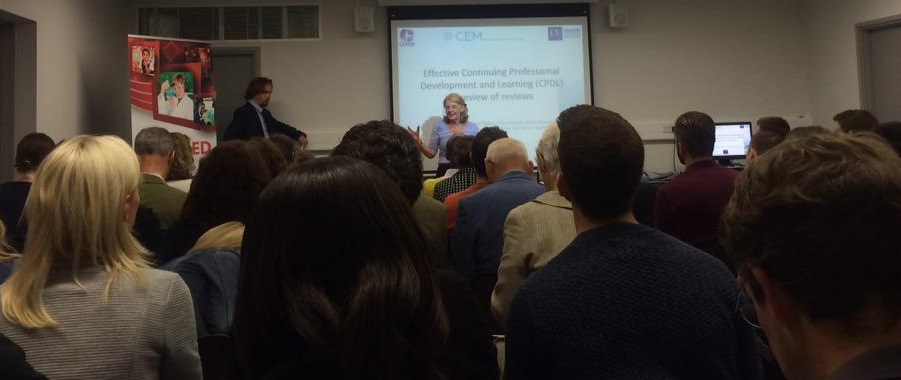
Another positive was the amazing ResearchED conference on Saturday 5th September. Some 750 teachers turned up for an intense conference that stretched from 9:00 am to 5:00 pm not to mention the session in the pub and the continuing debate over twitter and blogs the next day. You might enjoy the resources on the web site from the first session (which I led on) the practical implications of our new review of reviews about CPD evidence Developing Great Teaching, funded and published by TDT. The 70 plus colleagues there assessed how well their schools are making use of formal, informal professional learning opportunities and those for assessment for learning for teachers. As Alex Quigley puts it in his #rED2015 tweet, ‘Great activities to expose the reality of CPD – could do better!’ But we nonetheless had a ball exploring examples of great practice from the outliers who thought their school was using its full professional learning potential. You can find a blog from one participant here.
I missed the next session through follow up side conversations with lots of CPD, school and teacher leaders about CUREE’s work in helping schools realise their full potential through effective and efficient learning environments (see more below about SKEIN). I joined the tail end of Nick Gibb’s talk and even though I think the stories about learning styles and brain gyms are now out of date I thought his final epithet well crafted and amusing. I also enjoyed Russell Hobby’s engaging, properly critical and amusing reflections on evidence from management and what it does and doesn’t offer head teachers.
On to Tom Sherrington’s excellent analysis of the evidence about literacy for secondary pupils, the lamentable superficiality of a DFE guidance document and his own rigorous use of the evidence to plan – and evaluate next steps. Amazingly, without his knowledge, the two people who created the intervention he in the end selected for testing were sitting in the audience! (Fantastically captured on film by an attendee). Finally there was a panel session hosted by Pearson exploring CPD approaches, Professional Development: What Works? It was great to have a subject based perspective as well as ones based on a passionate commitment to evidence –rich CPDL from David Weston and me. My favourite question; what are the bright spots for CPDL on the policy horizon? Well (and this is a bit Mandy Rice Davies for older readers) obviously developing standards for CPDL presents an exciting opportunity (see below for more about this and the linked call for evidence). And the fact that OFSTED have included so much about CPDL and capacity building in the new framework presents an important opportunity too- so long as we all raise our expectations about what we give to and gain from CPDL without getting scared or reactive.
Route Map Launch is a Great Success
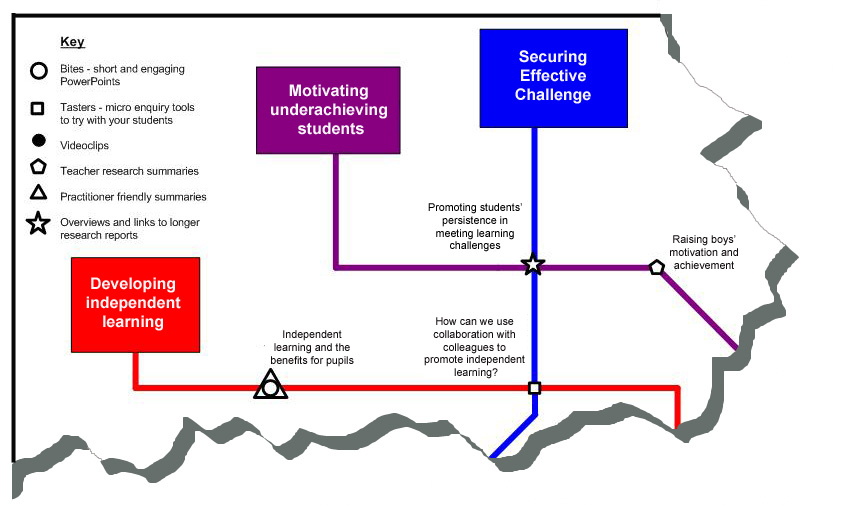
We recently launched a set of five, off-the-shelf Route Maps with a large secondary school in the north east. Belmont School in County Durham contacted us at the beginning of the summer with a request for more information about our bespoke and off-the-shelf Route Maps. After a series of exploratory conversations between the Route Map team and Dan, head of CPD at Belmont, we identified a ‘best fit’ for the team and Dan’s well-planned series of CPD sessions for the coming year. We settled on a set of five, closely aligned with their CPD and supporting the teaching team with evidence based tools and resources on instruction, literacy, feedback, pedagogy and Research Lesson Study.
Bart Crisp, Research Analyst at CUREE and lead for this Route Map, made the journey to Belmont School at the beginning of September to launch the five Route Maps to the team, explaining the evidence base and instructing the teachers on the use and value of each line in the Maps to support their Research Lesson Studies and provide the basis for their planning, preparation, study and evaluation. We are looking forward to working with Belmont and following their progress over the coming months!
For more information about Route Maps, contact Bart Crisp at CUREE, or take a look at an interactive example on our website.
Have Your Say on Teachers' Professional Development
The West Midlands CPD Network met in September to look at co-ordinating a regional response to the call for evidence from the Teachers’ Professional Development Expert Group. There was a lively discussion with threw up many interesting issues. The HE community was particularly energised by the issues and, understandably, highlighted what they saw as the key features of standards. It is important that this is not the dominant voice to reach the group; other providers and those on the receiving end should ensure their perspective is represented. The evidence call is open to 16th October – look here for more information and ways to respond.
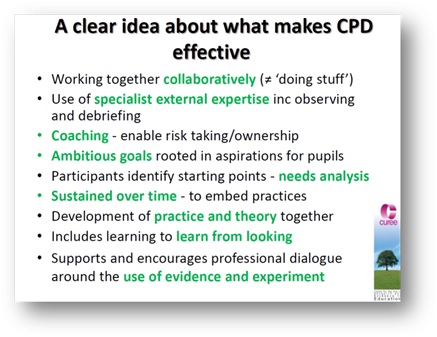
CUREE’s original evidence submission, following which the Expert Group was convened, can be accessed here.
I was very pleased to attend this special meeting of the CPD Network last month convened to look at and respond to the current call for evidence on “A standard for teachers’ professional development”. The Network, consisting of both HE and school-based teacher education providers, saw this as an important opportunity to contribute to the Expert Group’s thinking. There was a lot of discussion around the nature and purpose of CPD standards, the relationship between these standards and teacher professional standards (which the new College of Teaching is likely to take responsibility for) and the practicalities of how the standards might impact in the real world. There was some questioning of their relevance given the existence of existing ‘accredited’ programmes like masters degrees, the various NPQs and the various flavours of ‘outstanding teacher programme’. In response, others (including me) pointed out that:
a) there was scant evidence correlating programme accreditation with positive impact on pupils
b) many providers were choosing to mimic or clone accredited programmes with ones of their own (which may or may not comply with whatever standard underpinned the original); and
c) there were many critics of the franchised model of these programmes and the quality variations between different offerings of them (see this blog for an example)
These comments and others highlight some key issues like:
What are standards anyway? Are they more than a set of principles?
When you apply a single set of standards across a very diverse array of PD experiences (the Expert Group itself wanted views on whether we needed a standard for participants, another for leaders and another still for providers)?
A set of standards might be valuable but how were they going to be ‘policed’?
This last point is important and very practical, and applies to most of the existing CPD provision (including the ‘accredited’ stuff). The Expert Group (and the DfE) have not committed to any particular implementation of the standards or models of reward and/or sanctions. Despite this unknown, members of the CPD Network recognised the role of standards is fixing a quality bar; enabling school leaders to discriminate between good and less good provisions (including the provision they make themselves) and enabling teachers and others to resist the lure of the cheap or quick which gets strong when resources are scarce.
For my part, I drew attention to CUREE’s evidence which made an early contribution to the Expert Group’s deliberations. I pointed to an earlier form of standards formation – the National Framework for Mentoring and Coaching - which scaffolded a broad and generic set of principles with the practical guidance about the skill set and the application of the principles to practice. I also mentioned the standards developed by CUREE and embodied in the SKEIN model; which is particularly relevant where schools get beyond simplistic professional development and become cultures of professional learning.
Pilot for Effective Feedback
After many weeks of collaborative planning and preparation, we see the evidence at work in the first of many workshops to inform practice on effective feedback.
It was a reflective journey back from Huddersfield on Monday, across the Pennines on a spectacular and unseasonably warm September day. Roberttown Infant and Junior Church of England School were one of the first to pilot a new facilitated workshop developed by CUREE for The KEY and led by Teach First UK. It had been an exciting and very satisfying experience to join this group of practitioners as they were expertly guided through the workshop by their facilitator and Head, Louise. The feedback will be instructive for the final stages of development but this pilot was a positive first test of the robustness of the evidence and the value of feedback to pupils and students.
The evidence-based material on effective feedback developed by CUREE includes diagnostic and formative evaluation tools, practical activities with facilitator guidance handbooks and illustrations of answers. The modules are aimed at raising awareness, developing self awareness, knowledge, understanding, skills and the underpinning theory. There are 9 in total, each connected to the other and building on prior knowledge and skills. The first of these has now been through the piloting phase and we look forward to the continued collaborative work and development of the programme.
For more information about this work, or the ways in which we can support your school in effective feedback, please contact Gillian Spence.
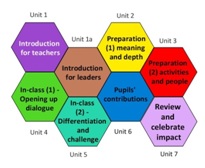
Lincolnshire Peer Review
As the new term started, so did an ambitious new project in Lincolnshire with CUREE facilitators working alongside local Headteachers to establish strong interschool networks and peer-evaluation systems across Lincolnshire’s schools. An extended project that will run over the next few months, the sessions will offer schools the frameworks needed to foster strong and supportive networking strategies as well as the tools to recognise what works. From the first workshop in September, Headteachers have engaged with the collaborative nature of the project and we at CUREE are excited to work with the schools involved further!
For further information, visit our site or contact Emma Culey.
Leadership of Professional Development and Learning
"Over the next five years implementing the curriculum, assessment and qualification reforms will present significant challenges to teaching and learning. Schools will need to:
- develop teacher capability to deliver reformed GCSE's and A levels, including a focus on preparing pupils for the new styles of examinations
- develop teachers' ability to undertake assessment that evidences pupil progress in learning
- build capacity in middle and senior leadership related to curriculm design and development"
So says the Guidance Paper on the Leadership of Professional Development and Learning recently published by the Association of School and College Leaders (ASCL) - with CUREE and TDT - setting out why its members should be as aspirational about the development of their professional colleagues as they already are for their students.
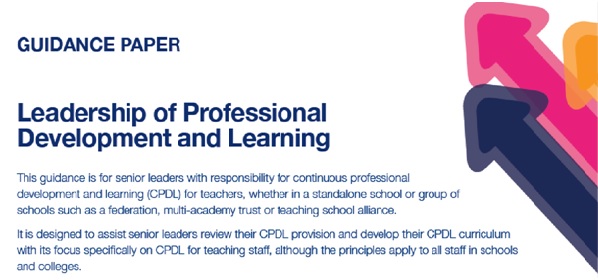
The Paper draws heavily on the review of the evidence undertaken by CUREE with Durham University and UCL Institute of Education and commissioned by the Teacher Development Trust published earlier this year and launched this summer in the House of Commons. Called Developing Great Teaching, that review and various user-friendly summaries of it can be downloaded from our website here.
The ASCL Guidance Notes outlines the findings of the research, explains clearly and compellingly why school leaders should take note of it and sets out in straightforward ways the four step process in developing a CPDL curriculum.
Out and About!
After a bit of a break over summer, CUREE have had a very busy and exciting start to the new academic year! In September we ran an Effective Mentoring and Coaching Workshop in Meadowbank before attending this year’s ResearchED conference in London – where Philippa facilitated a well attended workshop (both of which you can read more about in this very newsletter). At the BERA conference in Belfast we presented five papers produced at CUREE, and the month has also seen the beginning of an extensive new project in Lincolnshire working alongside local Headteachers.
October and November are also set to be busy months for CURE, and not just within the UK;
- Philippa is spending time in Boston working on a project with Pearson Academic Network.
- A large-scale project with the BFI having just started.
- Philippa speaking at Gothenburg University’s Centre for Educational Sciences and Teacher Research’s annual conference in November, which will focus on research-informed teaching within Sweden.
- Work with Bluewave Education school improvement and our continuing projects with NTL and Lincolnshire County Council.
It's set to be an exciting few months ahead!
Hello, Hello Goodbye
We would like to wish Lisa Bradbury luck in her new role as Professional Learning Manager for Sandwell Council, a loss for CUREE but a great asset for Sandwell! We would like to thank Lisa for all her work and fantastic contributions to CUREE over the years, she will be greatly missed. Deanna, our Research Coordinator has been offered a new opportunity working for Swanswell charity leading a research team. The work done by Swanswell is of great interest to Deanna and we wish her the best of luck in her new role.

We would also like to give a warm welcome to our new starters who have joined the team this academic year. Gillian Spence joined CUREE over the summer as Senior Professional Learning Manager. Gillian recently returned to the UK from New Zealand after working as Resource Development Manager for Auckland University Centre for Educational Leadership (UACEL). We think her extensive background in adult literacy teaching and project management will make her an asset to the team.

Following their recent graduation from university, Sam Back and Joe Askew also joined the CUREE team. After studying Politics at the University of Leicester, Sam has joined CUREE as a Research Assistant and has been involved with our projects with The Key and Warwickshire County Council. We also welcomed Joe as a Marketing and Administration Assistant who this year attained a first class degree in Theatre and Performance Studies from Aberystwyth University. Since joining he has been very busy updating CUREE’s marketing materials and co-ordinating a project with BFI.
Contact Us
Curee
Centre for Use of Research & Evidence in Education
8th Floor, Eaton House
Eaton Road, Coventry, CV1 2FJ
Registered in England No 4936927
Tel: 02476 524036
